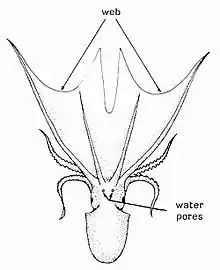
The nuchal organ, indicated by "no". Source: [1]
The nuchal organ is a ciliated pit[1] or groove present at the posterior end of the prostomium of annelid worms,[1] some cephalopods,[2] and other invertebrates.[3]
Annelids only possess one nuchal organ, although the nature of the grooving may make it appear to be a pair of organs.[4]
It may be involved in light detection,[2] and may have a role in food detection and mating.[5]
References
- 1 2 3 Hessling, R.; Purschke, Günter (23 October 2000). "Immunohistochemical (cLSM) and ultrastructural analysis of the central nervous system and sense organs in Aeolosoma hemprichi (Annelida, Aeolosomatidae)". Zoomorphology. 120 (2): 65–78. doi:10.1007/s004350000022. S2CID 38957268.
- 1 2 Parry, Matthew (October 2000). "A description of the nuchal organ, a possible photoreceptor, in Euprymna scolopes and other cephalopods". Journal of Zoology. 252 (2): 163–177. doi:10.1111/j.1469-7998.2000.tb00612.x.
- ↑ Peñalva-Arana, Carolina D.; Manca, Marina (1 August 2007). "An SEM study of the nuchal organ in Daphnia himalaya (nov. sp.) embryos and neonates collected from the Khumbu region (Nepalese Himalayas)" (PDF). Journal of Limnology. 66 (2): 153. doi:10.4081/jlimnol.2007.153.
- ↑ Purschke, G.; Wolfrath, F.; Westheide, W. (21 March 1997). "Ultrastructure of the nuchal organ and cerebral organ in Onchnesoma squamatum (Sipuncula, Phascolionidae)". Zoomorphology. 117 (1): 23–31. doi:10.1007/s004350050026. S2CID 39830837.
- ↑ Schlötzer-Schrehardt, U. (December 1986). "Ultrastructural investigation of the nuchal organs of Pygospio elegans (Polychaeta). I. Larval nuchal organs". Helgoländer Meeresuntersuchungen. 40 (4): 397–417. doi:10.1007/BF01983820.
This article is issued from Wikipedia. The text is licensed under Creative Commons - Attribution - Sharealike. Additional terms may apply for the media files.


